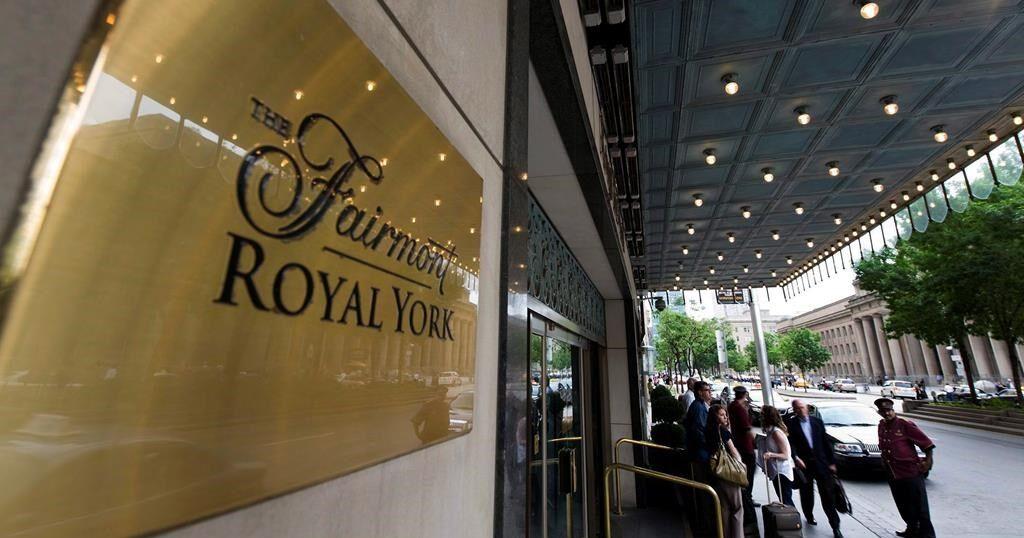WASHINGTON – President-elect Donald Trump’s promise to slap an across-the-board tariff of at least 10 per cent on all imports including from Canada is unlikely to apply to Canadian oil, energy experts are predicting.
The threat of the tariff is causing a lot of concern north of the border, where the Canadian Chamber of Commerce said such a tariff could take a $30-billion bite out of the Canadian economy.
Rory Johnston, a Toronto-based oil market researcher and founder of Commodity Context, said he believes there’s a very small probability that Trump’s fees would apply to Canadian oil, but it is “quite a potentially damaging one.”
“Canada is uniquely vulnerable to market pressure posed by U.S. refineries given our lack of alternative egress,” Johnston said during a panel for the Canadian Global Affairs Institute Wednesday.
Michael Catanzaro, a former Trump energy adviser, told a forum in Washington, D.C. last week that he doesn’t expect Trump’s campaign vision of energy dominance and lower energy costs will exclude Canada.
“We should double down on the fact that the U.S. and Canada together can be this powerful force,” he said at the North American Energy Preeminence Forum hosted by the right-leaning Hudson Institute in Washington on Nov. 8.
More than 77 per cent of Canadian exports go to the U.S. and trade comprises 60 per cent of Canada’s gross domestic product. A significant proportion of that comes from oil and gas.
Canada is also the largest source of U.S. energy imports, and almost all Canadian crude oil exports went to its neighbour in 2023. Most of that makes its way through pipelines to the Midwest, where the key battleground states flipped for Trump on promises of making life more affordable.
Without exemptions for Canadian crude, many experts agree that the cost at American pumps is certain to increase. It’s unlikely the Republican leader would take action that’ll make gas cost more, Johnston said.
Johnston added there could be a situation where Canada sees a boon from Trump’s tariffs. If the Republican leader puts those fees on all oil imports except Canada “that is actually a net good thing for Canadian exports.”
But all of this comes with the caveat that there’s been a rocky relationship between Prime Minister Justin Trudeau and Trump, and the Liberal government in Canada has been at odds with the Republican politically on a number of fronts including climate action and renewable energy.
Catanzaro recalled a meeting with Canadian officials after Trump pulled the U.S. out of the Paris Climate agreement, an international treaty to cut greenhouse gases, during his first administration — a move the president-elect has promised to repeat.
“They were very hostile to us and to the administration,” Catanzaro said.
The Canadian reaction set the bilateral relationship back for some time, Catanzaro said.
Fen Hampson, a professor of international affairs at Carleton University in Ottawa and co-chair of the Expert Group on Canada-U.S. Relations, said he’s not certain the Republican leader would be willing to give a tariff concession under Trudeau.
Hampson said Trump would know that giving Canada an immediate exemption would provide Trudeau a powerful argument about his ability to negotiate with the president-elect ahead of Canada’s looming election. The Republican leader would not be happy with that outcome, given their notably rocky relationship during Trump’s first administration, Hampson added.
Trump called Trudeau “weak” and “dishonest” after the prime minister criticized the president’s 2018 tariff actions at the G7 summit in Quebec. There was another blow-up when Trudeau and other NATO leaders appeared to be on video talking about a Trump press conference the following year. Trump called the prime minister “two-faced.”
Robert Lighthizer, Trump’s then-trade representative, recounted in his book that U.S.-Canada relations were “at their lowest ebb since the failed American invasion of Upper Canada during the War of 1812.”
The Canada-U.S.-Mexico Agreement, negotiated under the first Trump administration, will come under review in 2026. Hampson said Trump could use the tariffs, or a threat of them, to force Canada into concessions.
Wilbur Ross, the former U.S. commerce secretary who was involved in the negotiation of that trilateral agreement, recently told CBC that Trump is likely to carve out exemptions for sectors such as Canadian oil and gas.
Eric Miller, president of Rideau Potomac Strategy Group, said politicians run for office in poetry and govern in prose, agreeing that wide-reaching tariffs on Canadian energy were unlikely.
This report by The Canadian Press was first published Nov. 14, 2024.
